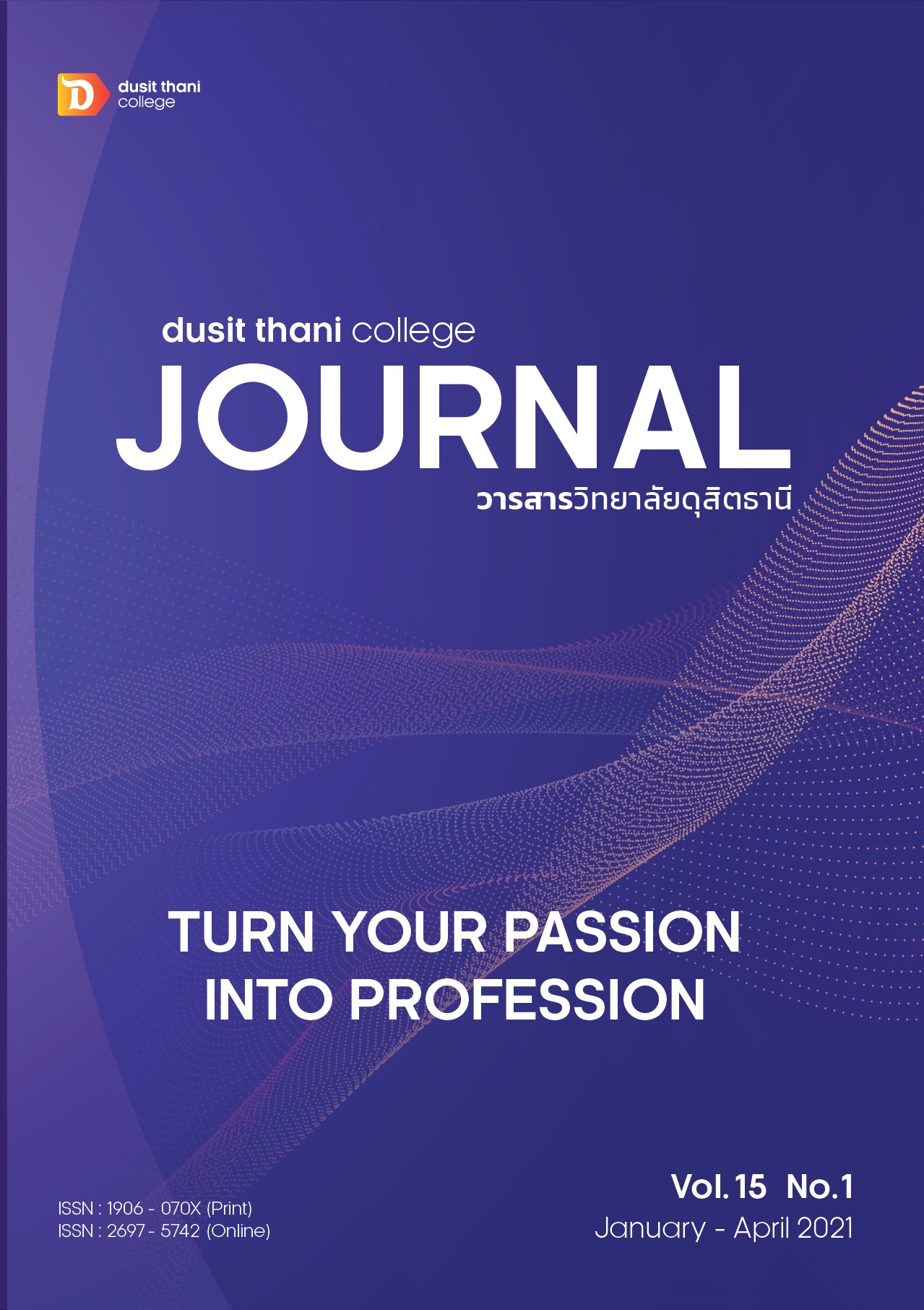กรอบแนวคิดของความสัมพันธ์ระหว่างรูปแบบภาวะผู้นำและผลการปฏิบัติของพนักงาน ผ่านตัวแปรกำกับและตัวแปรคั่นกลางร่วมกันของนวัตกรรมและวัฒนธรรมองค์กร
Main Article Content
บทคัดย่อ
บทความฉบับนี้มุ่งนำเสนอการเพิ่มพูนผลการปฏิบัติงานของพนักงาน โดยผ่านตัวแปรกํากับและตัวแปรคั่นกลางซึ่งสามารถทำงานร่วมกันของนวัตกรรมและวัฒนธรรมองค์กร โดยใช้กรอบแนวคิดของรูปแบบภาวะผู้นำเป็นตัวหลักในการศึกษาอุตสาหกรรมบริการในครั้งนี้ รูปแบบภาวะผู้นำถูกกำหนดให้เป็นตัวแปรที่ทำหน้าที่เพิ่มความสามารถของวัฒนธรรมองค์กรและวัฒนธรรมองค์กรจะถูกพิจารณาให้เป็นตัวเพิ่มความสามารถของผลการปฏิบัติงานของพนักงานเช่นกัน นอกจากนั้นวัฒนธรรมองค์กรยังถูกพิจารณาให้เป็นตัวแปรคั่นกลางระหว่างรูปแบบภาวะผู้นำและผลการปฏิบัติงานของพนักงานในขณะที่นวัตกรรมองค์กรได้ถูกพิจารณาให้เป็นตัวแปรกำกับระหว่างความสัมพันธ์ของรูปแบบภาวะผู้นำและวัฒนธรรมองค์กร ตลอดจนความสัมพันธ์ของวัฒนธรรมองค์กรและผลการปฏิบัติงานของพนักงานในอุตสาหกรรมบริการในประเทศไทย สำหรับกรอบแนวคิดที่ได้นำเสนอ ในบทความนี้จะช่วยขยายแนวทางในการอธิบายทฤษฎีของรูปแบบภาวะผู้นำที่มีวัฒนธรรมและนวัตกรรมองค์กรเข้ามากระทบความสัมพันธ์ ในการเพิ่มพูลผลการปฏิบัติงานของพนักงาน อีกทั้งยังช่วยแนะนำแนวทางแก่องค์กรและผู้บริหารในการรับรู้ถึงเหตุและผลกระทบที่เกิดขึ้นกับตัวแปรดังกล่าวในอุตสาหกรรมบริการในบริบทของประเทศไทย โดยผลจากการทบทวนวรรณกรรมที่เกี่ยวข้องอย่างเข้มข้นพบว่า ผลกระทบโดยตรงของรูปแบบผู้นำที่มีต่อวัฒนธรรมองค์กรและวัฒนธรรมองค์กรที่มีต่อการปฏิบัติงานของพนักงานการปฏิบัติงานของพนักงานในอุตสาหกรรมบริการตามบริบทของประเทศไทยอาจขึ้นอยู่กับการกำหนดวัฒนธรรมองค์กรที่เหมาะสมและระดับของวัฒนธรรมองค์กรเพื่อเพิ่มประสิทธิภาพการทำงานของพนักงานอาจขึ้นอยู่กับลักษณะความเป็นผู้นำรูปแบบความเป็นผู้นำเป็นแหล่งที่มาหลักในการกำหนดวัฒนธรรมองค์กรในธรุกิจบริการและเมื่อพิจารณาถึงความสัมพันธ์ระหว่างรูปแบบความเป็นผู้นำและผลการปฏิบัติงานของพนักงานเป็นสื่อกลางตามวัฒนธรรมองค์กรประสิทธิภาพการทำงานของพนักงานในอุตสาหกรรมบริการอาจเพิ่มขึ้นเช่นกัน
Article Details
นโยบายการพิจารณากลั่นกรองบทความ
- บทความวิจัยและบทความวิชาการทุกเรื่องที่จะได้รับการตีพิมพ์ต้องผ่านการพิจารณากลั่นกรองโดยผู้ทรงคุณวุฒิ (Peer Review) ในสาขาที่เกี่ยวข้อง จำนวน 3 ท่าน/บทความ
- บทความ ข้อความ ภาพประกอบและตารางประกอบที่ลงตีพิมพ์ในวารสารเป็นความคิดเห็นส่วนตัวของผู้เขียน กองบรรณาธิการไม่จำเป็นต้องเห็นด้วยเสมอไป และไม่มีส่วนรับผิดชอบใด ๆ ถือเป็นความรับผิดชอบของผู้เขียนแต่เพียงผู้เดียว
- บทความที่จะได้รับการตีพิมพ์จะต้องไม่เคยตีพิมพ์ เผยแพร่ที่ใดมาก่อน และไม่อยู่ระหว่างการพิจารณาของวารสารฉบับอื่น หากตรวจสอบพบว่ามีการตีพิมพ์ซ้ำซ้อน ถือเป็นความรับผิดชอบของผู้เขียนแต่เพียงผู้เดียว
- บทความใดที่ผู้อ่านเห็นว่าได้มีการลอกเลียนหรือแอบอ้างโดยปราศจากการอ้างอิง หรือทำให้เข้าใจผิดว่าเป็นผลงานของผู้เขียน กรุณาแจ้งให้กองบรรณาธิการวารสารทราบจะเป็นพระคุณยิ่ง
เอกสารอ้างอิง
Armbruster, H., Bikfalvi, A., Kinkel, S., & Lay, G. (2008). Organizational innovation:
The challenge of measuring non-technical innovation in large-scale surveys. Technovation, 28(10), 644-657.
Asrar-ul-Haq, M., & Kuchinke, K. P. (2016). Impact of leadership styles on employees’ attitude towards their leader and performance: Empirical evidence from Pakistani banks. Future Business Journal, 2(1), 54-64.
Avery, G. C. (2004). Understanding Leadership. London: SAGE.
Bass, B. M. (1997). Personal selling and transactional/transformational leadership.
The Journal of Personal Selling and Sales Management, 17(3), 19-28.
Burns, J.M, (1978), Leadership, N.Y, Harper and Row.
Campbell, J. P., & Wiernik, B. M. (2015). The modeling and assessment of work performance. The Annual Review of Organizational Psychology and Organizational Behavior, 2, 47-74.
Casimir, G. (2001). Combinative aspects of leadership style: The ordering and temporal spacing of leadership behaviors. Leadership Quarterly, 12(3), 245-278.
Chandra, T. (2016). The Influence of Leadership Styles, Work Environment and Job Satisfaction of Employee Performance--Studies in the School of SMPN 10 Surabaya. International Education Studies, 9(1), 131-140.
Dawson, M., Abbott, J., & Shoemaker, S. (2011). The hospitality culture scale: A measure organizational culture and personal attributes. International Journal of Hospitality Management, 30(2), 290-300.
Denison, D. R. 1996. What is the difference between organizational culture and organizational climate? a native's point of view on a decade of paradigm wars. Academy of Management Review. 21 (3): 619-654.
Dobni, C. B. (2006). The innovation blueprint. Business Horizons, 49(4), 329-339.
Gill, R. (2006). Theory and Practice of Leadership. London: SAGE Publications.
Gordon, J. R. (1999). Organizational Behavior: A Diagnostic Approach (6th ed.). Upper Saddle River, NJ: Prentice Hall.
Hage, J. T. (1999). Organizational innovation and organizational change. Annual review of sociology, 25(1), 597-622.
Hersey, P., & Blanchard, K. H. (1981). So you want to know your leadership style? Training and Development Journal, 35(6), 34-54.
Krungsri Research. (2020, January). Thailand Industry Outlook: 2020-2022. Retrieved May 25, 2020, from krungsri Security: https://www.krungsrisecurities.com/images.aspx?filename=http://www.krungsrisecurities.com/uploads/2020/01/research_en_US_10484_1_IO_Industry_Outlook_2020_2022_EN_EX.pdf
McFarland, L. J., Senn, L.E,, & Childress, J. R. (1993) twenty-first century leadership Dialogues with 100 Top Leaders, Long Beach, CA: Leadership Press.
OECD. (2005). Measuring Globalisation: OECD Economic Globalisation Indicators. Paris.
Pradhan, R. K., & Jena, L. K. (2017). Employee performance at workplace: Conceptual model and empirical validation. Business Perspectives and Research, 5(1), 69-85.
Rehman, S. U., Bhatti, A., & Chaudhry, N. I. (2019). Mediating effect of innovative culture and organizational learning between leadership styles at third-order and organizational performance in Malaysian SMEs. Journal of Global Entrepreneurship Research, 9(1), 36.
Schein, E. H. (2010). Organizational Culture and Leadership (4th ed.). SF: Jossey-Bass.
Shin, Y. (2013). The relationship between leadership styles, organizational commitment, and organizational outcome in Oklahoma’s volunteer fire departments
(Order No. 1542236). Available from ProQuest Dissertations & Theses Global. (1426247310). Retrieved from http://search.proquest.com/docview/1426247310?accountid=8401
Stamn, V. B. (2007). Managing Innovation, Design and Creativity. (2nd ed.). UK: John Wiley and Sons.
Waheed, A., Miao, X., Waheed, S., Ahmad, N., & Majeed, A. (2019). How new HRM practices, organizational innovation, and innovative climate affect the innovation performance in the IT industry: A moderated-mediation analysis. Sustainability, 11(3), 621.
Zumitzavan, V., & Udchachone, S. (2014). The Influence of Leadership Styles on Organisational Performance Mediated by Organizational Innovation: A Case Study of the Hospitality Industry in Thailand. International Conference on Economics, Management and Development.


